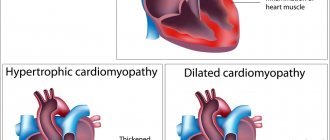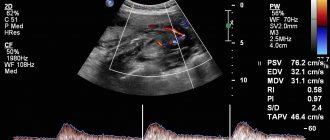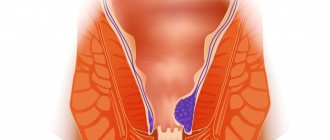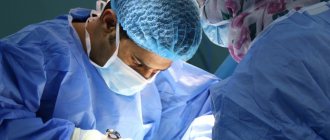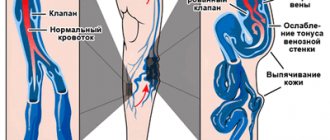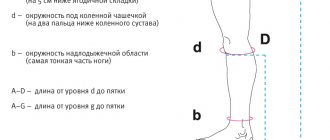Varicose veins and pregnancy... Pregnancy and varicose veins... Why do pregnant women develop symptoms of chronic insufficiency of the venous system? How does pregnant women experience impaired blood outflow from the vascular system of the lower extremities? What is the most common pathology of venous vessels that occurs during pregnancy and childbirth... Good answers to these questions will be given in this article.
Varicose veins and pregnancy
Varicose veins and pregnancy in modern human life turn out to be closely related conditions. Very often, such a pathology as varicose veins occurs during pregnancy and childbirth. The leading symptom of varicose veins is chronic venous insufficiency. According to state medical statistics, the incidence of venous insufficiency in pregnant women and women in labor is 35%, and in half of the patients the first manifestations of venous pathology occur during pregnancy. Varicose veins in pregnant women complicate the birth process and can lead to an increase in the incidence of maternal mortality. Chronic venous insufficiency in pregnant women can develop both against the background of previous traumatic or congenital abnormalities of the structure of blood vessels, and without previous pathological changes in the veins.
Causes
WARNING!
The information on the site is provided for informational purposes and cannot be used to make a diagnosis or make treatment decisions. The pregnancy period itself is a risk for the development of varicose veins. Causes of veins appearing on the abdomen.
- Enlarged uterus. Due to this, it stretches and the walls become thinner. The veins in the navel area are clearly visible. This causes anxiety in the expectant mother. Such phenomena signal an increase in intra-abdominal pressure with impaired blood outflow.
- Stretching of veins and blood vessels. This is also due to the growth of the uterus. The weakened capillaries burst and characteristic “stars” appear.
- Increased circulating blood. This is necessary to sufficiently saturate the body with oxygen and nutrients. This places additional stress on the veins.
- Compression of internal organs. Intestinal displacement leads to disruption of the regularity of bowel movements. Due to this, intra-abdominal pressure increases.
- Placenta previa. A common complication in pregnant women. Accompanied by blocking of the uterus in the lower part, compression of blood vessels in the pelvis. There is a violation of blood microcirculation.
When a fertilized egg appears in the uterus, a woman’s body experiences hormonal changes.
Progesterone and estrogen soften blood vessels. This leads to their thinning and increases the risk of developing varicose veins.
Pathophysiology of varicose veins in pregnant women
From the standpoint of modern European phlebology, the main pathophysiological mechanism for the development of varicose veins is a slowdown in venous outflow from the vascular system of the legs, leading to various microcirculatory damage. Venous stagnation leads to the development of a chronic inflammatory process, which provokes a subsequent expansion of the lumen of the saphenous veins. The consequence of this process will be damage and failure of the valve apparatus of the venous vessels, which normally prevents the reverse flow of blood. The so-called pathological venous reflux is formed, i.e. reverse reflux of blood in the superficial vein system, and normal outflow in deep venous vessels is also disrupted. At the tissue level, a number of pathological processes occur, leading to cell damage and death.
Causes of varicose veins in pregnant women
Why are varicose veins and pregnancy so closely related? How does pregnancy provoke the development of varicose veins? As the fetus grows, the pressure of the uterus on the inferior vena cava and iliac veins increases. Venous pressure leads to vasodilation and the formation of valvular insufficiency of the main veins. This process accelerates and intensifies against the background of heavy lifting, stool disorders and diseases of the bronchopulmonary system. Sometimes valvular insufficiency of the veins develops against the background of existing phlebothrombosis, accompanied by destruction of the valve leaflets of the deep veins, which further aggravates the situation with venous blood flow. Thus, pregnancy is a significant provoking factor in the development of varicose veins and chronic venous insufficiency.
Symptoms
In general, veins on the abdomen during pregnancy are a normal occurrence. Especially in women with pale and thin skin. In this case, there is no danger to health.
Previously, doctors believed that varicose veins could only affect the lower extremities. In expectant mothers, such phenomena were associated exclusively with physiological changes.
Modern medicine defines a condition as hypertension.
Characteristic symptoms:
- nausea;
- vomit;
- pain in the navel area;
- swelling;
- veins protrude from the abdomen;
- decreased appetite;
- insomnia.
The danger of a woman’s condition can be assessed only after a full, comprehensive examination.
Why is it dangerous?
If veins appear on the abdomen during pregnancy, this can be accompanied by dangerous manifestations. The risk of such phenomena begins from the 5th month. In severe cases, this can cause termination of pregnancy.
With such disorders, the uterus may more often become toned. Especially when changing position, in the morning or after a long rest.
The entire therapy process is complicated by the fact that most anticoagulants are contraindicated in pregnant women. Therefore, therapy mainly consists of the use of folk remedies and the use of compression garments.
It is important to adhere to proper nutrition and avoid strenuous physical activity.
Varicose veins can cause:
- thrombosis;
- internal hemorrhage;
- premature placental abruption;
- complicate labor;
- the risk of complications in a newborn baby.
Varicose veins of any location are a dangerous disease.
At the first alarming signs, the expectant mother should seek medical help. This will help avoid the development of negative consequences for the fetus and the pregnant woman.
Factors that increase the likelihood of developing varicose veins in pregnant women.
According to modern European studies, including in the Moscow region, the likelihood of developing varicose veins increases with each subsequent pregnancy. Increased blood volume, hormonal changes in the body and increased cardiac output contribute to the development of venous stagnation. In addition, the enlarged uterus in late pregnancy puts strong pressure on the inferior vena cava and iliac veins. As a result, severe venous hypertension develops.
Symptoms of varicose veins during pregnancy
Increased production of the hormone progesterone during pregnancy also helps to reduce the tone of the venous wall. As a result of these factors, the vein becomes more distensible, the valve apparatus fails to cope with its function, and varicose veins appear. Thus, the leading factors for the development of varicose veins in pregnant women are the following: changes in hormonal levels, an enlarged uterus, an increase in total blood volume.
When and who to contact
Dangerous manifestations:
- excessive visual appearance of veins;
- painful sensations in the abdomen;
- bowel dysfunction;
- general malaise;
- poor results of blood and urine tests;
- pain on palpation in the abdominal area;
- increase in the size of the liver and spleen.
If a woman observes the development of such symptoms, she should immediately contact a gynecologist who is managing the pregnancy. Additionally, you may need to be examined by a gastroenterologist, vascular surgeon, or endocrinologist.
Diagnostics
A reliable diagnosis can only be made after a full examination. Initially, the doctor must listen to the patient’s complaints, study the anamnesis, and conduct an examination.
In this case, it is important to study the external condition of the skin - determine the color, the presence of rosacea, the degree of varicose veins. Additionally, it is necessary to measure blood pressure.
The doctor must determine whether the woman suffers from chronic, genetic diseases. It is important for a woman to tell the truth about her own lifestyle. This will help the specialist determine whether there is a predisposition to varicose veins.
Pregnancy itself is a risk factor. A woman should get tested regularly. The results allow you to monitor the condition of the expectant mother.
Blood tests.
- General analysis.
- Biochemical analysis. Carry out to assess the performance of internal organs.
- Coagulogram. Allows you to determine blood clotting and liver condition.
Urine studies.
- General analysis.
- Daily diuresis.
Additional methods.
- Endoscopy. This method allows you to assess the condition of the gastrointestinal mucosa. Refers to instrumental examinations.
- Ultrasound with Dopplerography. The ability to thoroughly examine the condition of veins and internal organs.
- ECG. For the diagnosis of cardiovascular diseases.
If the results are not sufficient to establish a diagnosis, then the doctor may additionally prescribe the following examinations:
- biopsy;
- laparoscopy;
- X-ray;
- MRI;
- CT.
If a vascular network appears on the abdomen during pregnancy, in any case you should consult a doctor. This will reassure the woman and, if necessary, the specialist will choose a safe method to eliminate the problem.
Varicose veins during pregnancy
Varicose veins during pregnancy progress with each month and can reach a severe stage. In the future, this leads to consequences such as trophic ulcers or thrombophlebitis.
The main mistake that pregnant women make is self-medication. Under no circumstances should you prescribe physiotherapy, knitwear or medications if you are not knowledgeable in this area and are not a practicing phlebologist. This will not only aggravate varicose veins during pregnancy, but will also harm the baby. To choose a competent treatment regimen, make an appointment at the First Phlebological Center.
What accelerates the development of pathology?
- Complete lack of physical activity.
- Genetic predisposition.
- Excess weight (body weight increases due to changes in metabolic rate).
- Mild stage of the disease even before conception.
Varicose veins during pregnancy often make themselves felt due to changes in the body. A shift in hormonal balance, especially progesterone and estrogen, causes weakening of the venous walls and valves. The uterus grows and puts pressure on the tissue, which makes it difficult for the valves to work and increases the load. In this case, the tissues fill with blood, the structure changes - they wriggle, expand, lengthen, etc.
Advice: at the pregnancy planning stage, consult a phlebologist to exclude possible complications. If your parents suffer from this pathology, then you are at risk. The doctor will prescribe you therapeutic exercises, compression stockings and medications that will not have a toxic effect and will help you to be 100% insured against complications. This is mandatory if you have already encountered spider veins and swelling of the lower extremities.
How to stay healthy?
To prevent varicose veins from progressing during pregnancy, follow our recommendations:
- Give your body adequate physical activity. The main thing is not to overdo it, so as not to overload the valves. Physical exercise helps normalize blood circulation.
- Several times a day, while lying down, throw your legs up on the wall to ensure rapid blood flow. This will help avoid stagnation.
- Compression hosiery is very effective, but must be selected by a phlebologist after examination. It will help improve the functioning of superficial and deep veins and fill the vessels with blood. Remove stockings or tights only when necessary. They will give results only if worn regularly.
- Use venotonics to prevent varicose veins during pregnancy or to avoid severe symptoms. Ointment, cream, gel or tablets are selected by a specialist after a medical examination.
Be sure to undergo surgery to remove inflamed venous areas even before conception if you suffer from this disease. This will help avoid a severe form, which leads to serious complications.
uses minimally invasive treatment methods, so the operation is easily tolerated and there are no complications. Specialists with at least 10 years of experience will conduct an examination and help you avoid complications. You can make an appointment through the feedback form or by phone on weekdays.
